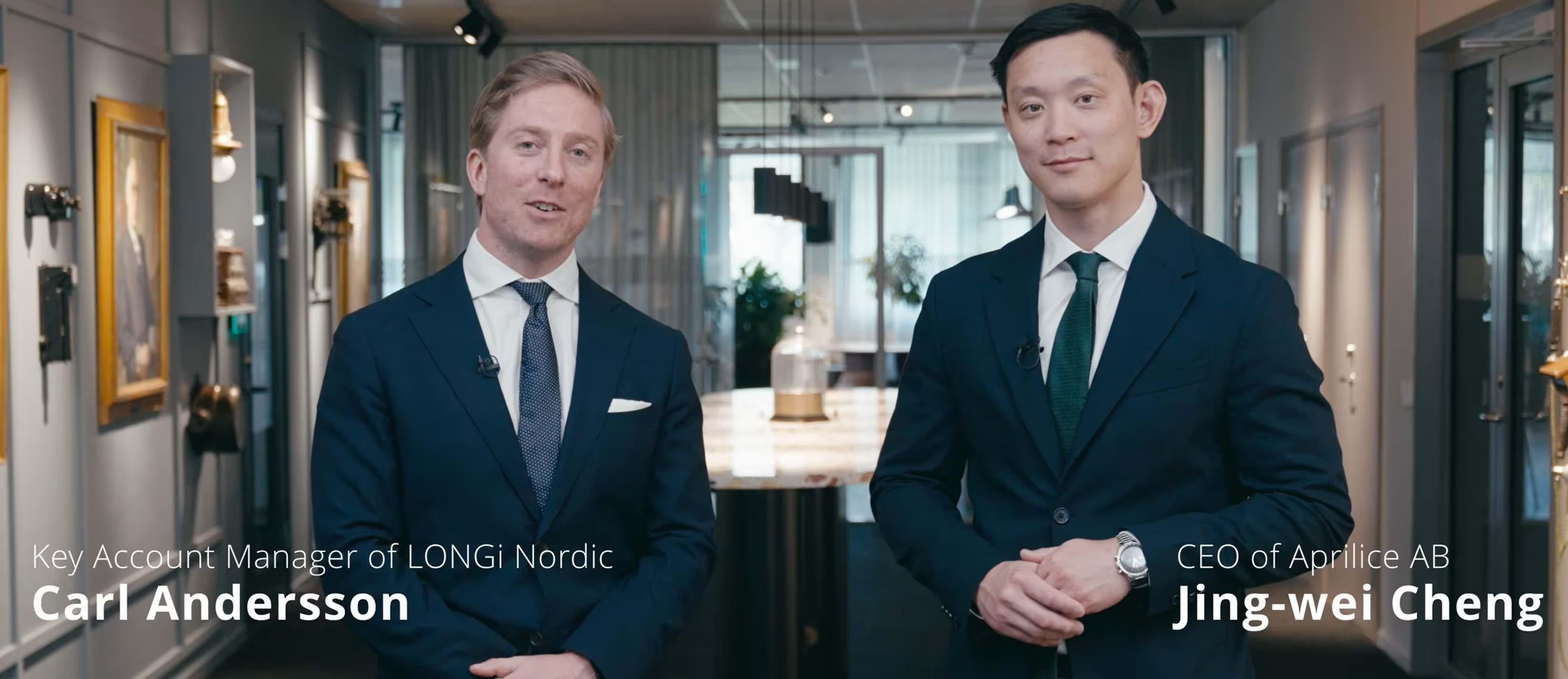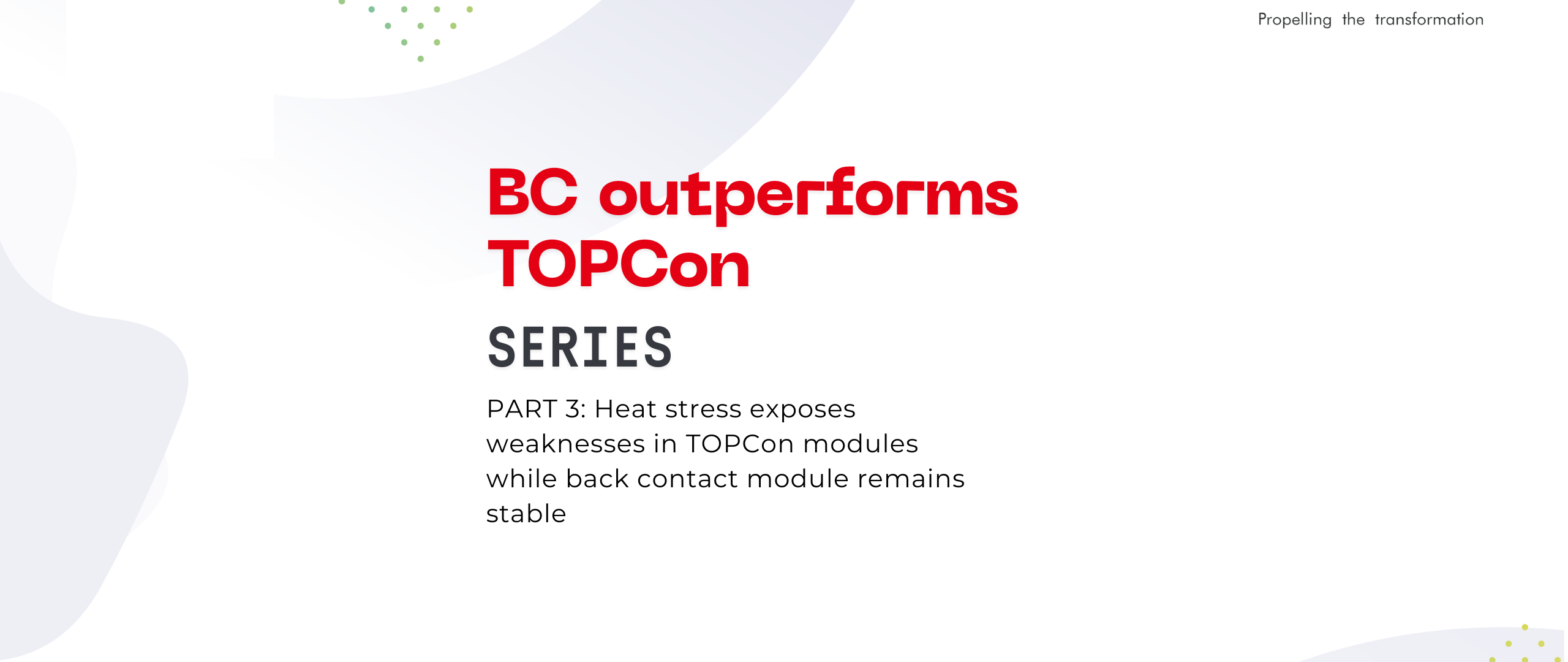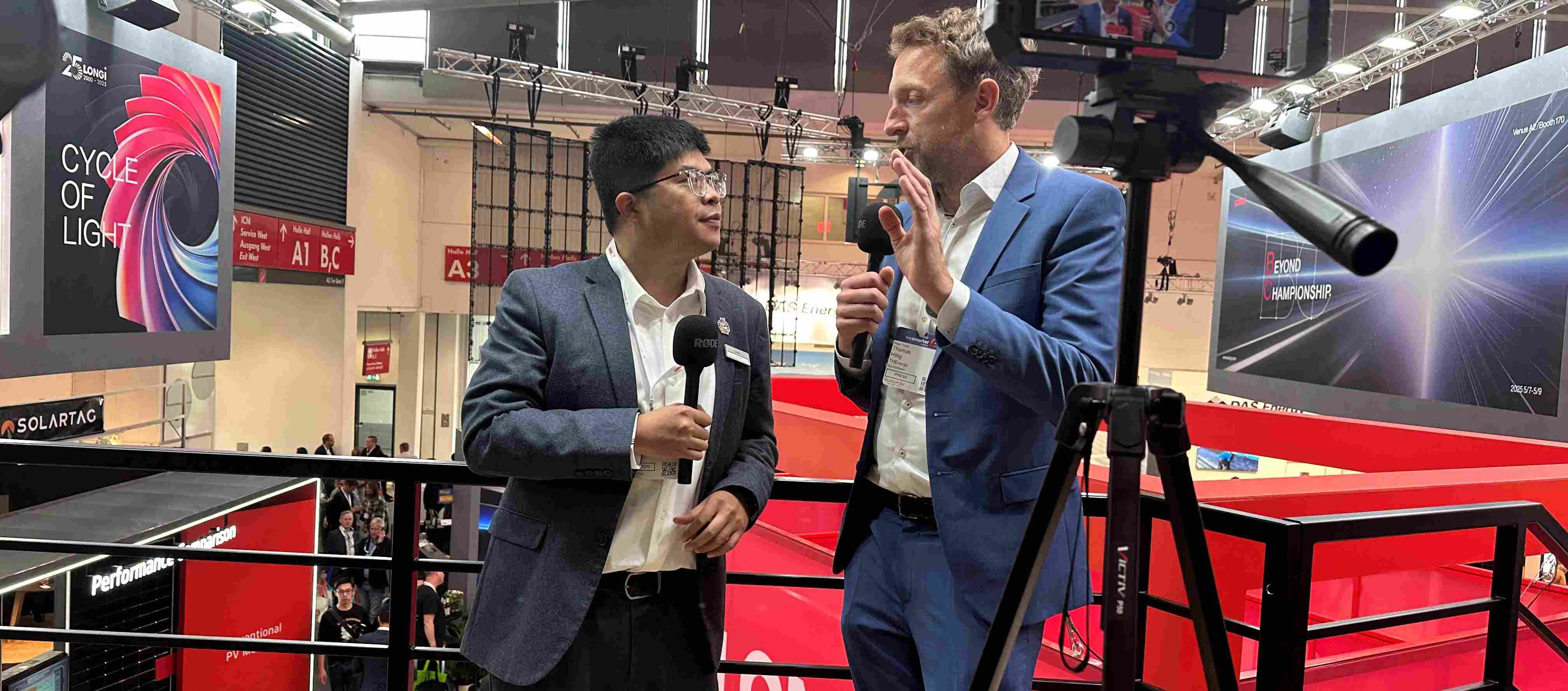Chao Jia van LONGi neemt deel aan de UNCTAD-dialoog in Genève om innovatie en duurzaamheid op het gebied van zonne-energie te benadrukken
.avif)
Date
September 5, 2025
read time
4
Minutes
Subscribe to the LONGi Newsletter
Het historische Palais des Nations was het toneel van een belangrijke mijlpaal in het wereldwijde gesprek over duurzaamheid: de High-Level Dialogue on Building Sustainable Business and Brands, bijeengeroepen door het Sustainable Business Leaders Forum (SBLF) met steun van de UNCTAD. De sessie was bedoeld als een brug tussen Chinese bedrijven, internationale instellingen en beleidsdeskundigen om te bespreken hoe duurzaamheid kan worden ingebed in de kern van moderne bedrijven.
Tijdens de dialoog kwam een invloedrijk panel bijeen: Zhao Yan, voorzitter en CEO van Bloomage Biotech; Lin Wei, vicepresident Sustainability and Investor Relations van Anta Sports; een senior vertegenwoordiger van de UNCTAD; en Chao Jia, president van het Europe Business Center van LONgi Green Energy. De moderator, Allen Lai, bestuursdirecteur van het Executive Committee of Sustainable Business Leaders Forum, leidde de drie uur durende uitwisseling rond enkele van de meest prangende vragen in duurzaam ondernemen van vandaag: hoe ontwerp je groene toeleveringsketens, bevorder je circulaire economie en communiceer je duurzaamheidsreferenties zonder over te gaan op greenwashing?
LONGi, als een van's werelds grootste bedrijven op het gebied van zonnetechnologie en een centrale stem voor hernieuwbare energie, stond stevig in de schijnwerpers.
.jpg)
Veerkrachtige toeleveringsketens in tijden van disruptie
De discussie begon met de vraag hoe Chinese bedrijven hun toeleveringsketens herontwerpen om de koolstofintensiteit te verminderen en tegelijkertijd hun wereldwijde marktaandeel te behouden. De moderator wees op de enorme uitdagingen van de afgelopen jaren: overaanbod in de zonne-energiesector, dalende moduleprijzen en wereldwijde recordvoorraden.
De reactie van Chao Jia onderstreepte een belangrijke les: veerkracht is het nieuwe concurrentievermogen. „LONGi bouwt zijn toeleveringsketen op samenwerking en gedeelde verantwoordelijkheid”, legt hij uit. „Met een ISO 20400-gecertificeerde inkoop, een duidelijke gedragscode voor leveranciers, ESG-audits en een traceerbaarheidsbeheersysteem met TÜV Rheinland AA-rating zorgen we ervoor dat elke partner in onze waardeketen bijdraagt aan veerkracht, transparantie en duurzaamheid op lange termijn.”
Het punt was niet abstract. Voor een sector die geconfronteerd wordt met prijsdalingen en geopolitieke handelsfricties, is het beheer van de toeleveringsketen een doorslaggevende factor geworden. LONGi vereist dat elke leverancier een gedragscode ondertekent die betrekking heeft op arbeidsrechten, anticorruptie en milieubescherming. Nieuwe partners moeten de ESG-risicoscreening doorstaan en bij lopende audits wordt de naleving getest. Leveranciers met een hogere risicoblootstelling worden nauwer in de gaten gehouden en ondersteund met corrigerende maatregelen.
Jia plaatste dit in een bredere context: „Vrijwillige duurzaamheidsnormen worden de taal van vertrouwen over de grenzen heen. Normen zoals ISO 14067, de Franse ECS-certificering en milieuproductverklaringen zijn niet langer optioneel. Het zijn de benchmarks die bepalen wie toegang heeft tot belangrijke markten. Zonder hen zou de Chinese export worden uitgesloten; daarmee winnen bedrijven aan geloofwaardigheid.”
Maar hij benadrukte ook een groter punt: „Normen zijn belangrijk omdat ze transparantie en vergelijkbaarheid bieden, maar ze mogen niet het einddoel zijn. Voor elk wereldwijd bedrijf moeten duurzaamheidsdoelstellingen de mensheid dienen, niet alleen audits doorstaan. Daarom stemmen we ons werk af op de duurzame ontwikkelingsdoelstellingen van de VN, omdat deze doelen het grotere geheel weerspiegelen: waarde creëren voor mensen, gemeenschappen en de planeet.”
Circulariteit begint met innovatie
Het gesprek ging vervolgens over de circulaire economie en hoe Chinese praktijken wereldwijd kunnen worden opgeschaald. Voor Jia is duurzaamheid de sterkste vorm van circulariteit. „Bij LONGi richten we ons in het bijzonder op twee dingen: het verhogen van de efficiëntie en het bouwen van uiterst betrouwbare modules via Back Contact-technologie. Zo wordt circulariteit werkelijkheid.”
Hij illustreerde dit met praktijkvoorbeelden. De nieuwste Back Contact-modules van LONGi uit de EcoLife-serie worden geleverd met 30 jaar prestatiegaranties, waardoor verspilling wordt voorkomen doordat er minder voortijdige vervangingen nodig zijn. Sinds 2018 heeft het bedrijf het gebruik van aluminium in zijn modules met 33 procent en folie met 20 procent verminderd, terwijl tot 30 procent gerecycleerd materiaal in glas is verwerkt. Ecodesign speelt ook een rol: fluorvrije backsheets en recyclebare module-architecturen zijn bedoeld om toekomstig terugwinning in een gesloten kringloop mogelijk te maken. Jia's benadrukte: „Circulariteit mag niet bijzaak zijn. Het moet vanaf het begin worden ingebouwd, vanaf het ontwerp tot het einde van de levensduur.”
Voor het publiek in Genève onderstreepte het voorbeeld van een toonaangevende fabrikant die dergelijke praktijken in de reguliere productie verankerde de haalbaarheid van circulaire economieprincipes op grote schaal.
.jpg)
R&D als brug tussen winstgevendheid en duurzaamheid
Een centrale vraag van de moderator was hoe bedrijven kostendruk kunnen verzoenen met duurzame productlevenscycli. Voor de zonne-energie-industrie, die er vaak van wordt beschuldigd in prijzenoorlogen naar de bodem te zijn geracet, was de vraag bijzonder relevant. „R&D is de brug tussen winstgevendheid en duurzaamheid”, zei Jia, en voegde eraan toe: „Beter presterende modules betekenen minder materialen, lagere arbeidskosten en een hoger rendement voor klanten. Tegelijkertijd biedt innovatie de industrie een uitweg uit de destructieve prijsconcurrentie. Het verschuift de waarde van goedkope producten naar prestaties en betrouwbaarheid op lange termijn.”
De bewijspunten van LongI zijn tastbaar. De Back Contact-roadmap, van HPBC 2.0 tot HIBC, biedt modules met een ongeveer acht procent hogere efficiëntie dan reguliere concurrenten, wat zich vertaalt in een lagere LCOE en een lager materiaalgebruik. De TaiRay-wafeltechnologie van het bedrijf verlaagt de energie-intensiteit in de productie, waardoor de duurzaamheidsvoordelen in de hele waardeketen nog meer toenemen.
In Europa heeft LONGi producten aangepast aan de behoeften van de echte wereld: het merk EcoLife voor huiseigenaren integreert veiligheid, ESG-referenties en levenslange garanties, terwijl een nieuwe module met 60 cellen voor commerciële daken zo is ontworpen dat één installateur dit aankan - een belangrijk voordeel waarbij de arbeidskosten 30 procent van de totale projectkosten kunnen bedragen.
„Met dit soort innovaties kunnen we hogere projectprijzen en zelfs 50 tot 100 procent premies realiseren op de woningmarkt”, merkte Jia op. „Dat is het duidelijkste bewijs dat innovatie en duurzaamheid samen waarde creëren.”
Transparantie zonder slogans
De moderator stelde vervolgens een vraag die wereldwijd weerklank vond: hoe kunnen Chinese merken over duurzaamheid communiceren zonder het risico te lopen beschuldigd te worden van greenwashing?
Jia voerde aan dat LONGi brede claims op het gebied van duurzaamheidsmanagement zou vermijden en zich zou concentreren op bewijs. „Transparantie is geen slogan, maar een fundamenteel onderdeel van ons bedrijfsmodel”, zei hij. LONGi publiceert specifieke, verifieerbare statistieken, zoals het aandeel groene elektriciteit in zijn activiteiten, gecertificeerde emissiereducties en onafhankelijk gevalideerde duurzaamheidstests. De duurzaamheidsrapportage is afgestemd op de GRI-, SASB- en TCFD-kaders en rapporteert niet alleen openlijk over prestaties, maar ook over gebieden waar verbetering nodig is.
Cultureel erfgoed en langetermijnvisie
Tijdens de dialoog in Genève werden panelleden ook uitgenodigd om na te denken over hoe cultureel erfgoed vorm kan geven aan duurzame branding. Jia verbond Chinese tradities met moderne ESG-praktijken. „De Chinese cultuur leert harmonie tussen mens en natuur. Ons principe van 'solar for solar', dat wil zeggen het produceren van hernieuwbare energie met hernieuwbare energie, is een moderne uitdrukking van dit erfgoed.”
Hij benadrukte ook de waarden van zuinigheid en zuinig omgaan met hulpbronnen, wat tot uiting komt in de inspanningen van LONGi om het materiaalgebruik te verminderen en recyclebare modules te ontwerpen. Confucianistische tradities van collectieve verantwoordelijkheid, zei hij, herinneren bedrijven eraan dat hun plicht zich uitstrekt over toeleveringsketens, werknemers en gemeenschappen. En misschien wel het belangrijkste is dat het Chinese erfgoed een prijs stelt voor langetermijndenken: „Dertig jaar garanties, stappenplannen voor fabrieken zonder CO2-uitstoot en toekomstgerichte innovatie weerspiegelen allemaal deze mentaliteit. We hebben altijd vooruit gedacht en gehandeld op de wereldwijde zonne-energie-industrie. Daarom worden we gezien als pioniers, niet als volgers.”
De rol van de UNCTAD
Het panel besloot met een reflectie over de rol die de UNCTAD kan spelen bij het afstemmen van vrijwillige duurzaamheidsnormen op de zakelijke realiteit. „De kracht van de UNCTAD is niet om nieuwe normen te creëren, maar om ze te helpen af te stemmen op de zakelijke realiteit”, zei Jia. „Bedrijven hebben vaak te maken met versnipperde vereisten in verschillende markten. De UNCTAD kan overheden, industrieën en normalisatie-instellingen bijeenroepen om benaderingen te harmoniseren, het MKB te ondersteunen en ervoor te zorgen dat duurzaamheidsnormen zowel ambitieus als praktisch blijven. Die afstemming maakt standaarden niet alleen geloofwaardig, maar ook schaalbaar, en dat is waar de UNCTAD echte impact kan creëren.”
.jpg)
De missie van LONGi in Europa
In zijn slotopmerkingen gaf Jia een persoonlijke reflectie over de rol van LONGi:
„We zijn opgericht door ondernemers en wetenschappers, en ons DNA is altijd wetenschap en R&D geweest. We hebben pionierswerk verricht op het gebied van grote technologische verschuivingen en wereldrecords gevestigd op het gebied van efficiëntie. In Europa is onze missie heel duidelijk: achter huishoudens, bedrijven en gemeenschappen staan met zonnetechnologie waarop ze decennialang kunnen vertrouwen. Europa heeft ervoor gekozen het voortouw te nemen in de strijd tegen de klimaatcrisis, en het is onze rol om dat leiderschap veerkrachtig te maken - niet alleen voor vandaag, maar ook voor de generaties die ervan afhankelijk zullen zijn.”
De dialoog in Genève over duurzaam ondernemen en merken onderstreepte hoe nauw de toekomst van handel, industrie en klimaatactie nu met elkaar verweven is. De interventies van LONGi, van de veerkracht van de toeleveringsketen tot circulariteit, O&O, transparantie en cultureel erfgoed, hebben aangetoond hoe een Chinese leider op het gebied van zonne-energie probeert de onmiddellijke commerciële realiteit te verzoenen met de behoeften van de planeet op lange termijn.
De boodschap was duidelijk: duurzaamheid en concurrentievermogen zijn geen tegenpolen. Zoals Jia het uitdrukte: „Echte veerkracht komt voort uit het op één lijn brengen van de twee. Wanneer groene activiteiten, groene producten en groene gemeenschappen centraal staan, bouwen we zowel aan blijvende voordelen als aan een eerlijkere toekomst.”
.jpg)


.avif)

